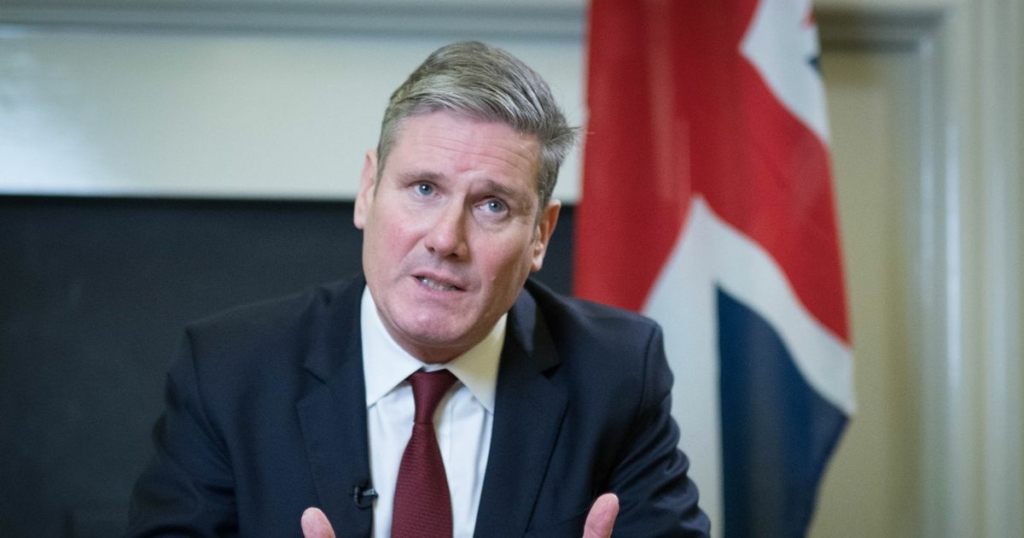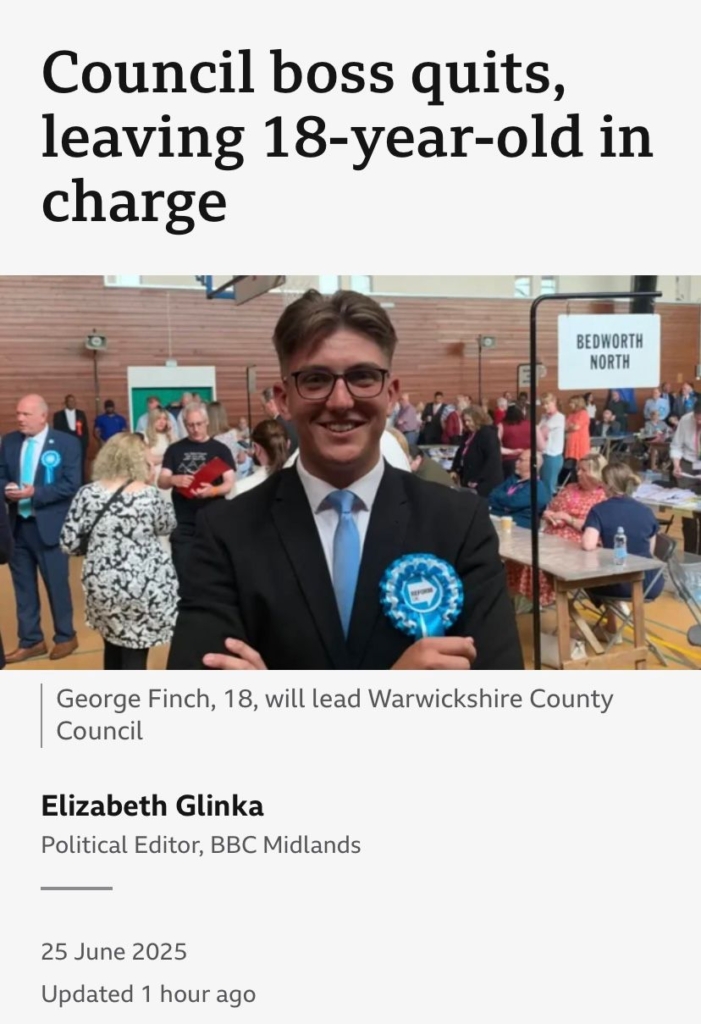Starmer is in Trouble, but so is everyone else
All political parties are in crisis. Starmer’s MPs are rebelling against his draconian welfare reforms at a scale and intensity that makes it a significant threat to the Prime Minister’s entire project, such as it is. Robert Peston has written:
“Labour’s whips are in despair. So said a number of senior Labour MP. And they are not professional troublemakers. They are loyal – largely – to the PM. This captures the failure in the party machine exposed by the massive rebellion of Labour MPs against the prime minister’s welfare reforms. What these MPs have told me is that whips, led by Sir Alan Campbell, have been warning 10 Downing Street officials for weeks that the Universal Credit and Personal Independence Payments Bill is hated by large numbers of their own side, and they have been ignored. Keir Starmer’s chief of staff, Morgan McSweeney, told them that the data showed the reforms were popular with voters, that Labour MPs should toughen up, and the government was pressing ahead regardless – according to multiple sources. This steamrollering has brought a government with an enormous working majority to the brink of losing legislation central to its ambitions to make the welfare state more affordable.”
The Financial Times has framed it like this (A defeat Keir Starmer can’t afford): “Less than a year after his landslide victory, Keir Starmer is facing a defining moment. If the next few days go badly, we may well look back on this as the last effective week of his authority. The parliamentary revolt against proposed welfare reforms is an existential crisis both for the prime minister and for his government. This is not the usual tussle over amending legislation, painful enough but commonplace. Instead, around 120 of Starmer’s own MPs — enough to wipe out his majority — are threatening to sink an entire piece of legislation before it has even begun the amendments stages of its passage through parliament. It is one thing to compromise, another to cave in to those wanting to torpedo a vital bill.”


Always sure footed, Anas Sarwar chose this week to pin his colours to the mast of this disastrous legislation (Anas Sarwar backs UK disability benefit cuts as Labour MPs revolt) and Murray Foote reminds us that “a timely reminder that five obsequious Scottish Labour MPs – Graeme Downie, Blair McDougall, Frank McNally, Gregor Poynton and Joani Reid – so strongly supported Starmer/Kendal’s benefits catastrophe that they very publicly put their names to it” (Scottish Labour MPs back ‘progressive’ UK Government welfare reforms). As Paul Hutcheon laments today: “Anas Sarwar refuses to back Labour welfare rebels as he offers support to Keir Starmer on the UK Government’s cuts bill. His position is in contrast to the criticisms of mayors Sadiq Khan and Andy Burnham.”
So far, so disastrous.
But other parties are also in disarray.
Politics UK reports dozens of Tory MPs believe that if Kemi Badenoch is still leader by next spring, there will be “very little left”, One ex-minister said: “Kemi’s personal polling is in Liz Truss territory. There is now no precedent for it”. Tim Shipman lays out the scale of Badenoch’s disastrous leadership at the Spectator ‘It’s Liz Truss territory’: how bad are things for Kemi Badenoch?.
Reports from the SNP’s recent National Council are of John Swinney having lost the floor and being repeatedly challenged with Alyn Smith making what some have described as an ‘open pitch’ for the leadership and taking apart recent strategy, or lack of it. My sources say that Swinney’s inability to respond to calls across the party and the wider independence movement will be terminal for him.
Meanwhile, over at the troubled Alba party, they have turned down Craig Murray, Scotland’s Ambassador to the UN to stand as a candidate. The given reasons are a) his prison sentence and b) standing for the Workers’ Party in Blackburn. Despite George Galloway’s Damascene turn towards declaring his support for Independence, the Worker’s Party of Britain’s long-standing position has been against it, and Galloway was a key pawn in Better Together’s 2014 propaganda campaign. He called independence ‘sectarian nationalism’ and campaigned enthusiastically for Better Together. To be turned down via vetting for one political party is unlucky, to be turned down twice is something else, even if the feeling is that Kenny McAskill must have felt threatened by the Ambassador.


The announcement of Alba blocking Murray had some suggesting he should join the ISP. More as we have it from this breaking story.
Meanwhile, down south, a Reform UK councillor has resigned as leader of Warwickshire county council just five weeks after he was elected, leaving his 18-year-old deputy in charge of the £500m budget.


How do you explain this collective shambles? Reform are a disaster-area flush with the loot of ex-Tory donors but filled with swivel-eyed loons and consistently falling apart whenever they have to either campaign or govern. Alba are a shard of a shard already descending into bitter factionalism and a pastiche of the Judean Popular Front.
The Conservatives have destroyed themselves over a decade of infighting and a descent into crazed policies and platforms that have no rationale other than feeding the insatiable culture wars and appetite of Britain’s rabid right-wing media.
Labour and the SNP are both riddled with a managerialist outlook and an inability to confront vested interests in either country. Both have been lobbied into submission and driven to corporate capture. The result is a bleak and bland conformist political landscape with few options to inspire. But it is also a reflection of a lack of purpose seen in different ways in both parties of government in Scotland and England. The purpose seems to have been reduced to the pursuit of power at all costs, and then once in power being totally resigned to an inability to effect real meaningful change.

Well said. All parties are bought and sold for (mainly US) billionaire gold. This is why none of them have any people or policies worth listening to. To paraphrase Henry Ford, you can have any colour you like so long as it’s neoliberal.
The prospective next mayor of New York – a Muslim, Ugandan Asian with a Syrian wife and a strong supporter of Palestine, gives me some hope that perhaps someone on this side of the Atlantic will turn up that I could actually vote for.
I’ve already spoiled my ballot in the local and UK elections. I hope I don’t have to make it a hat trick
If there was an election for the Scottish Parliament tomorrow Mike who would you vote for 1st and 2nd votes?
Good question. I’m not sure tbh. It would depend on the candidates and whether my vote had any bearing and how the parties respond. I need to have a reason to support someone.
Interesting analysis, though I don’t know if I would agree that Reform is in trouble – rising in the polls, and being the natural protest vote for former Labour and Tory voters (SNP too?) the formers’ plight will inevitably be their gain.
Farage is the only leader at present who knows how to do politics.
Arguably the party sticking closest to neoliberalism, Labour seems to think leading is managing, and that economic growth is all that’s needed to win the next election (with financial analysts the only ones trusted on what will bring said growth).
It’s interesting in Scotland how support for independence has grown since the last election, while support for the SNP has flatlined. It’s rightly recognised that this is the path that would likely lead to real change. Though I worry that arriving at a convincing pro-independence majority requires a leader. Most probably this would be the SNP leader, but this cannot be a managerial technocrat i.e. Swinney. I’m pretty ignorant on who the candidates would be but just hope no-one from the neoliberal side of the party wins.
Reform are in trouble as much as their bubble is burst when they encounter reality (ie have to campaign or have policies or credible candidates). Also there’s some evidence that there is a ceiling on Reform support for now of 30% approx.
Duncan – John Swinney was not a success when he was previously leader of SNP and Alex Salmond had to return as party was failing. JS only got leadership position last year because party was struggling and all of the younger candidates saw role as a poisoned chalice at that point. JS has temporarily stopped the infighting and the decline in SNP support but his lack of ambition and inspirational leadership is becoming evident again as witnessed by growing gap in support for independence and SNP.
Successors – not sure but Stephen Flynn has a more combative approach, not dissimilar to Alex Salmond, and is probably favourite to takeover from Swinney. Whether there is leadership challenge before 2026 election I would doubt though this will depend on how SNP support holds up bearing in mind they could win Holyrood election with support in low 30% mainly due to Reform primarily taking support from Labour and Tories. I am also not sure if electorate in Scotland would be impressed with SNP changing leader and First Minister again (would be 4th FM in 4 years without an election!) I suspect polls would have to show SNP losing 2026 election before there would be a change of leadership.
Fascinating and informative. Thank you.
I am reminded of the idea from Omar El Akkad’s current book, One Day Everyone Will Have Been Against This, that the important thing for liberals is not what they stand for or favor, but that they look good. This, I think, goes far towards explaining a “politics” that is a bag near completely empty when shaken by the challenge of events. Starmer et al are simply appearances…and that they appear good, should suffice. The real crisis, then, is their failure to so appear. When “image is everything” translates into a failure of image…there’s the political crisis at hand. Now.
I should make a subtle but perhaps important distinction/correction: Akkad did not say it was sufficient that a liberal “look good,” but that s/he “appear good.”